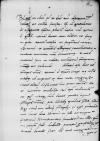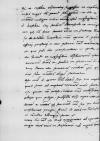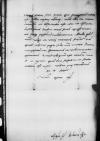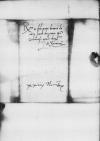Letter #1369
Jan CHOJEŃSKI to Ioannes DANTISCUSVilnius, 1535-11-13
| received [1535]-11-24 Manuscript sources:
Auxiliary sources:
Prints:
| ||||||||
Text & apparatus & commentary Plain text Text & commentary Text & apparatus
Reverendissimo in Christo Patri, Domino, domino
Reverendissime in Christo Pater et Domine, domine observandissime.
Salutem et omnia fausta.
Quod mihi gratulatur de assecuto episcopatu Plocensi, habeo Vestrae Reverendissimae Dominationi gratias. Utinam liceat iam tandem eo frui in quiete, daretur occasio, ut frequentius una essemus et iucundis colloquiis familiariter in mutua amicitia nostra frueremus, quod futurum spero in reditu
Allatum est huc ad
Ego etiam me obtuli
Quod dominus
In tutanda innocentia Vestrae Reverendissimae Dominationis quidqu[id] officii praestari a me poterit, nihil intermitte[tur], de quo sibi certo persuadeat Vestra Reverendissima Dominatio.
De iuramento et negligentia consiliariorum istarum terrarum
Quod Vestrae Dominationi Reverendissimae nihil datum sit pro impend[io], quod fecit ad nuptias veniens, inde factum est, quia non petiit, nemo enim inconsolatus abiit, qui petiit, pulsanti enim aperietur. Miratur
Novi hic nihil est. Post expugnatas ab exercitu regio duas arces in
Quod reliquum est, commendo me Dominationi Vestrae Reverendissimae, quam diu sospitem et fortunatam esse cupio.
Vestrae Reverendissimae Dominationis obsequens frater



